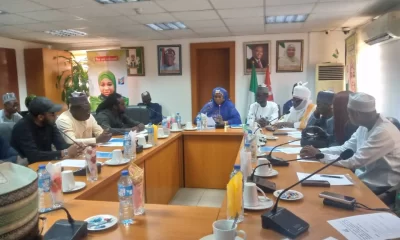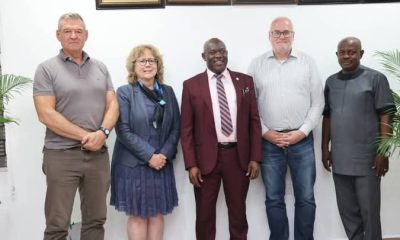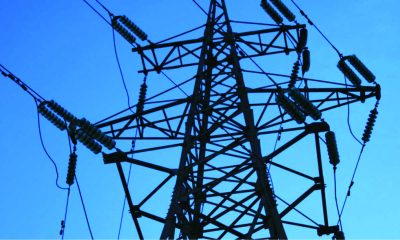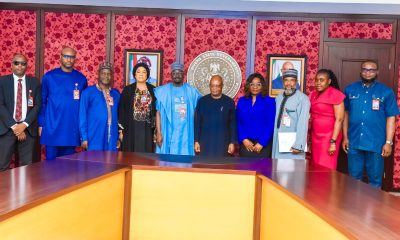City Crime
test
City Crime
Nigeria Unveils 90,000km Fibre Optic Network Boost Nationwide

City Crime
RSG Tasks Federal Government On Maternal Deaths
The Rivers state Government has urged the Federal Government to address the high rate of maternal deaths in the country.
Permanent Secretary, Rivers State Ministry of Health, Dr Mekele Comfort Igwe, made the call while declaring open a four-day capacity building workshop in Port Harcourt, recently.
The workshop, which was organised by the State Ministry of Health with support from the Federal Ministry of Health and Social Welfare, was aimed at developing realistic and effective operational health plans for 2026 that will shape the state’s health budget and improve public health outcomes.
Themed “Realistic and Effective 2026 Annual Operational Plan That Informs Health Budget for the People of Rivers State,” the training brought together selected health managers across the State to enhance their capacity in evidence-based health planning under Nigeria’s Sector-Wide Approach.
Igwe stressed the need for the country to address the issue of maternal mortality, describing the present ranking of Nigeria as the global capital for maternal deaths as a poor assessment of the nation’s health sector.
He described the workshop as a critical step in addressing the state health challenge through strategic planning and collaborative problem solving.
“Today marks another step in our journey towards effective health planning for the people of Rivers State. This workshop builds on the foundation laid by the Master Trainers’ training held in Abuja from June 30 to July 4. We are here to cascade that knowledge to ensure more people are equipped for the tasks ahead,”she said.
She reaffirmed the state’s commitment to the Nigeria Health Sector Renewal Initiative and praised development partners for their continued support.
“I thank all our development partners for their unwavering commitment and financial support under the new funding arrangement.
“Their intervention has been crucial in helping us survive our worst health challenges,” she added.
Also speaking at the event, Dr. Dozie Nwokedi, a representative from the Federal Ministry of Health and Social Welfare, reiterated the Federal Government’s commitment to transforming the health sector through the Renewed Hope Agenda of President Bola Ahmed Tinubu.
Nwokedi stated that the ongoing reforms are aimed at reducing physical and financial burdens on Nigerians seeking healthcare, increasing health insurance coverage, and promoting the local production of medical consumables and equipment.
“We are here to support Rivers State in strengthening the capacity of its health workforce.
“The goal is simple: save lives, reduce pain, and provide quality healthcare for all Nigerians. These reforms are built on a strategic blueprint that includes four pillars, three enablers, 27 priority initiatives, and 265 interventions,” he said.q
Also speaking at the workshop, the Director of Health Planning, Research, and Statistics in the Rivers State Ministry of Health, Dr. Juhanne Woke, explained the rationale behind holding the workshop in July, noting that it aligns with the national health planning framework.
“This program is a vital part of preparing for the 2026 health sector budget. By Quarter 3 of each year, we are expected to begin planning using data and evidence generated within the current year,” Dr. Woke said.
She called on participants not to lose faith in the system despite past frustrations.
“I know some of us may be weary with the thought of ‘same old garbage in, garbage out.’ But I urge you to believe that meaningful change starts small. Let us all pull in one direction towards better health outcomes,” she added.
John Bibor
Business
Food Security: NDDC Pays Counterpart Fund For LIFE-ND Project
-

 Business3 days ago
Business3 days agoPETROAN Faults NNPC’s PH Refinery Retention
-

 Business3 days ago
Business3 days agoFG Boosts Local Energy Supply Chain
-

 Business3 days ago
Business3 days agoNigeria, China Opens $2b Maritime Investment
-

 Business3 days ago
Business3 days agoFOCPEN Seeks Direct Energy Purchase From GenCo
-

 Nation3 days ago
Nation3 days agoUNEP Report: Stakeholders Take Stock, Score HYPREP High
-

 Business3 days ago
Business3 days agoFOCPEN Also Urged That There Must Be Regulatory Sanctions Against EEDC
-

 Featured3 days ago
Featured3 days agoNigeria’s Sustainability Challenges Are Not Insurmountable, Says Ibas
-
Sports3 days ago
AFN Confirms Ofili’s Turkey Move

